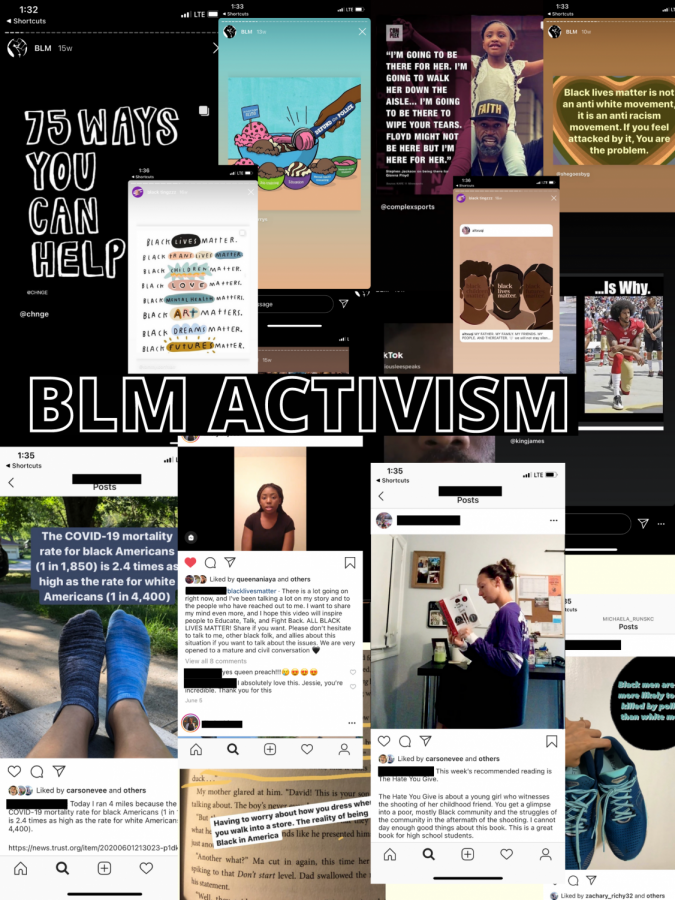#TakingAStand: Social Media Activism
September 24, 2020
During the summer of 2020, amid the COVID-19 pandemic, the Black Lives Matter (BLM) movement gained more and more momentum, making it a highly recognized issue. The movement has spurred some students and teachers to use social media to speak out about the social inequality in the black community.
Junior Jessie Philips has become active in spreading awareness about the movement by speaking out on social media. With her social media platform, she reaches more people than she could ever talk to face-to-face.
“I shared my story on social media as well as the stories of my family members and friends of color. I reshared many of the posts I saw from government officials, black artists, and activists. They used their voices to advocate for black lives. I try my best to put petition links in my bio and provide different stories to share with people who might struggle to find the flaws in our justice system. I post anything I can to get the word out about BLM, even though I do not have a huge following,” said Philips.
Even without a significant following, Philips does the best she can to spread the ideas of BLM. With the rise of the BLM movement, Philips sees hope for the future in solving these social issues in the world today.
“It opened my eyes to different possibilities in the future in terms of the election and law enforcement. BLM gave me more of a voice and made me not afraid to express my opinions and views. It made me conscious about how others view different issues, and [it taught me to] always be polite and kind, no matter the situation. BLM taught me not to back down even when the fight gets hard and to always stand up for what I believe in,” said Philips.
Philips has found her voice on social media and is unafraid to express her opinion. Like Philips, senior Sydney Strauss vocalizes her opinion on the Black Lives Matter movement with social media.
“Like most people who advocate for BLM, I want justice for the black people who were murdered by the police, I want them all in jail. I want the police to be defunded and reformed, and overall I want everyone to care and everyone to join, I want equality for everyone. Nobody deserves to die based on their skin color,” said Strauss.
However, students are not the only ones advocating for BLM. French teacher Michaela Parisi is active on social media in sharing the ideas of the movement. Parisi is also an active runner and dedicates many of her runs and marathons to the goals of the BLM movement.
“With social media, I can reach people around the world instead of just my small friend group. I can make my friends and family in other states aware of the issues. I also have several followers from outside the U.S., and I think it’s important for them to see and to know the injustice that is taking place,” said Parisi.
By posting, sharing, and running, Parisi advocates for the civil rights of all African Americans and their communities. Social media allows people to share what they want, even when some do not have similar beliefs.
“Unfortunately, I have some family members who are not very supportive of the BLM movement. They don’t see the need for reform. And that’s mainly the category of people I want to inform with my posts. I also received an outpour of support, especially from my fellow runners and teachers. People have donated to different social justice organizations, donated books to my classroom library, and shared my posts,” said Parisi.
Parisi is aware of the different views regarding this topic, and appreciates the support she has gotten from fellow BLM activists. Strauss sees the support for BLM along with her own on social media, but she is also familiar with the different views people hold about the movement.
“Of course there are going to be people that don’t support this, and those types of people honestly disgust me. They either ignore it and say that black people are not being oppressed or they come up with a counter movement like blue lives matter, and it shows that they are completely aware of what is happening,” said Strauss.
As a teacher, Parisi realized that she must become a role model for her students and fellow teachers in expressing her opinions on social equality. Parisi knows the movement is important for all of her African American students and is as relevant today as it was fifty years ago.
“Unfortunately I, like so many other white Americans, didn’t pay attention until it was “convenient” for us. Looking at all the names of those killed or wrongfully convicted I just kept thinking, that could be my student. I am white. I am privileged. And I have a position of power as a teacher and a coach to impact change. So I knew I couldn’t stay silent because there are people watching me,” said Parisi.
Many people came to the same realization, and there was an influx of support on social media until Parisi, Strauss, and Philips alike noticed a steady decline in the amount of support the movement was receiving, at least on social media. Philips is appreciative of the people who participated on social media, but she thinks some may have been simply following the crowd.
“I know lots of people tried to show support, but posting one black screen will not do anything. That is why I thought BLM was mostly a trend in June and July. People want to fit into the algorithm social media gives us, but the problem is trends go away. These experiences don’t; the pain doesn’t fade away. That’s why I try to keep posting something about it, whether it is only once a day or post a whole Ted Talk on my feed. I want people to realize that this is real life and not just the latest trend,” said Philips.
Parisi realizes the African American people that have been killed should not be used to post as a trend. She believes the families and communities that have been affected by this violence should be treated with more importance, not hashtags.
“Black bodies should not be displayed as a hashtag. A black person being harmed by police should not be a viral sensation, it should be a private affair that is handled internally with an investigation as to why this horrendous event occurred. It sickens me to see a community that should be protected by the police, harmed. These are human beings, not hashtags,” said Parisi.
Philips urges others to not be afraid to speak their mind on social media and advocate on behalf of African American people.
“I’m only one of a few students who spoke up about the issues. Anyone can use their platform, no matter how small, to advocate for good because this is our future we are fighting for and the next generations as well. Don’t be afraid to fight for what you believe in. Black lives matter today, tomorrow, and forever,” said Philips.
Social media activism has become a current and important concept in society today. Many students and teachers have taken advantage of social media platforms to express themselves and their views, as well as share important information for the BLM movement.




